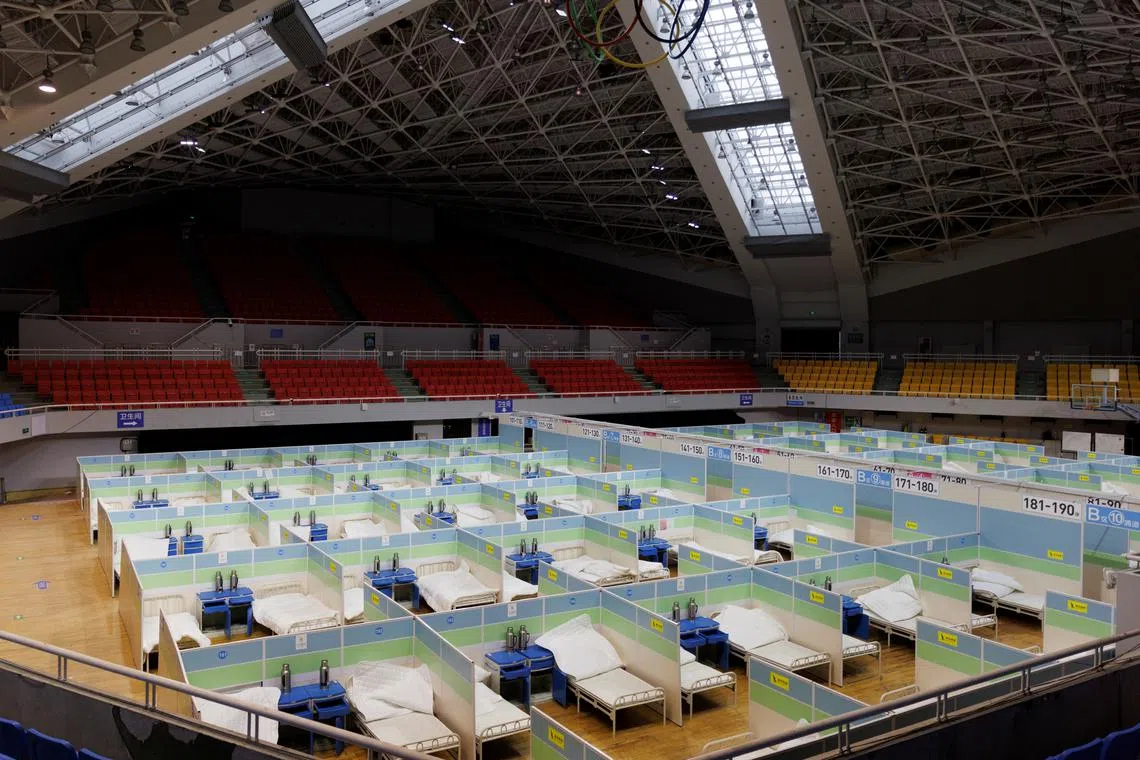China races to bolster health system as Covid-19 surge sparks global concern
Sign up now: Get insights on Asia's fast-moving developments

Beds seen at a fever clinic that was set up in a sports stadium in Beijing on Dec 20, 2022.
PHOTO: REUTERS
Follow topic:
BEIJING/WASHINGTON - Cities across China scrambled to install hospital beds and build fever screening clinics on Tuesday, as the authorities reported five more deaths and international concern grew about Beijing’s surprise decision to let the virus run free.
China started dismantling its stringent “zero-Covid” regime
Now, as the virus sweeps through a country of 1.4 billion people
“Every new epidemic wave in another country brings the risk of new variants, and this risk is higher the bigger the outbreak, and the current wave in China is shaping up to be big,” said Associate Professor Alex Cook, vice-dean for research at the National University of Singapore’s Saw Swee Hock School of Public Health.
“However, inevitably China has to go through a large wave of Covid-19 if it is to reach an endemic state, in a future without lockdowns and the economic and political damage that results,” he added.
US State Department spokesman Ned Price said on Monday the potential for the virus to mutate as it spreads in China was “a threat for people everywhere”.
Dr Xu Wenbo, an official with the Chinese Centre for Disease Control and Prevention, told reporters that new mutations would occur but played down concerns.
“New strains’ immune escape ability becomes stronger, more contagious,” said Dr Xu.
“But the possibility of them becoming more lethal is low. The possibility of strains that are more contagious and more pathogenic is even lower.”
Beijing reported five Covid-19-related deaths on Tuesday, following two on Monday which were the first fatalities reported in weeks.
In total, China has reported just 5,242 Covid-19 deaths since the pandemic erupted in the central city of Wuhan in late 2019, an extremely low toll by global standards.
But there are rising doubts that these statistics are capturing the full impact of a disease ripping through cities after China dropped curbs including most mandatory testing on Dec 7.
Since then, some hospitals have become inundated, pharmacies have been emptied of medicine and streets have been unusually quiet as residents stay home, either sick or wary of catching the disease.
“It’s a bit of a burden to suddenly reopen when the supply of medications is not sufficiently prepared,” said Mr Zhang, a 31-year-old delivery worker in Beijing who declined to give his full name. “But I support the reopening.”
Some health experts estimate that 60 per cent of people in China – equivalent to 10 per cent of the world population – could be infected over the coming months and that more than two million could die.
In the capital Beijing, security guards patrolled the entrance of a designated Covid-19 crematorium where Reuters journalists last Saturday saw a long line of hearses and workers in hazmat suits carrying the dead inside. The news agency could not immediately establish if the deaths were due to Covid-19.
Speaking at the same news conference as Dr Xu, the head of Peking University First Hospital’s infectious disease department Wang Guiqiang said that only deaths caused by pneumonia and respiratory failure after contracting Covid-19 would be classified as Covid-19 deaths. Heart attacks or cardiovascular disease causing the death of infected people will not get that classification.
In Beijing, which has emerged as the main infection hot spot, commuters, many coughing into their masks, were back on the trains to work and streets were coming back to life after being largely deserted last week.
Streets in Shanghai, where Covid-19 transmission rates are catching up with Beijing’s, were emptier and subway trains were only half-full.
“People are staying away because they are sick or they are scared of getting sick, but now, I think it’s because they are actually sick,” said trainer Yang at a nearly empty Shanghai gym.
Top health officials have softened their tone on the threat posed by the disease in recent weeks, a U-turn from previous messaging that the virus had to be eradicated to save lives even as the rest of the world opened up.
They have also been playing down the possibility that the now predominant Omicron strain could evolve to become more virulent.
“The probability of a sudden large mutation... is very low,” Dr Zhang Wenhong, a prominent infectious disease specialist, told a forum on Sunday in comments reported by state media.
But there are mounting signs that the virus is buffeting China’s fragile health system.
Cities are ramping up efforts to expand intensive care units and other treatment facilities for severe Covid-19 cases, the state-run Global Times reported on Monday.
The authorities have also been racing to build fever clinics, facilities where medical staff check patients’ symptoms and administer medicine. Often attached to hospitals, these clinics are designed to prevent the wider spread of contagious disease in healthcare settings.
In the past week, major cities including Beijing, Shanghai, Chengdu and Wenzhou announced that they had added hundreds of fever clinics, according to government WeChat accounts and media reports.
A gym in Beijing’s Shijingshan district was converted into a fever clinic late last week with cubicles containing more than 150 beds covering a basketball court, Reuters witnessed.
The spreading virus is expected to crimp China’s economy, expected to grow 3 per cent this year, its worst performance in nearly half a century.
A survey by World Economics showed on Monday that China’s business confidence fell in December to its lowest since January 2013.
China kept benchmark lending interest rates unchanged for the fourth consecutive month on Tuesday. REUTERS

